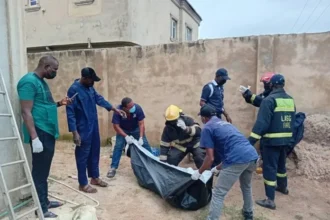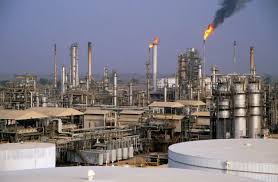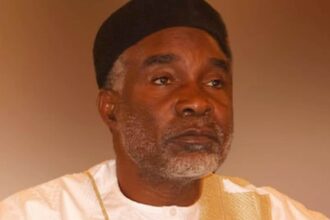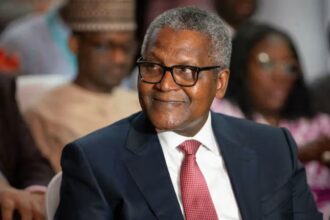...To get all news updates, Join our WhatsApp Group (Click Here)
Also Join our WhatsApp Channel (Click Here)
For 19-year-old Terhile Jirbo, it was another answer to the call of nature. But when gunfire rang out that fateful afternoon of March 18, what seemed a harmless routine had left a fatal scar on him and his community in Gboko, a major town in the North-central state of Benue.
Members of Mbayion community in Gboko had responded after a soldier shot Mr. Jirbo for emptying his bowel near the Gboko Cement factory, the second most lucrative cement factory belonging to Africa’s richest man, Aliko Dangote. The attacker was one of two-dozen troops securing the multibillion-dollar factory.
In protest of the shooting, the community members marched outside the factory, and for hours, they asked for justice. But as they hurled insults at the soldiers, asking them to leave the community, the troops responded with gunfire, according to state officials, witnesses, and community leaders.
Shot on the leg, one woman laid bloodied on the ground, and tried to crawl to safety. Then, a soldier closed up on her, pointed his rifle directly at her head and blasted, a witness said.
The woman’s brain splattered on another bullet-ridden victim, a man feigning death next to her. That man survived the attack even after a bullet ripped open his abdomen, spilling out his intestines. When the shooting and the confusion subsided over three hours later, the death toll stood at seven – one woman, six men.
The victims – aged 36 and below – were all shot dead by troops of the Nigerian army, survivors and community members said. By chance or fate, Mr. Jirbo, the teenager whose shooting by a soldier ignited the fracas, survived the attack. But he would be deformed for life, his mouth disfigured with most teeth in his upper jaw (maxillae) emptied. A member of the more than two-dozen military team guarding the multibillion-dollar Gboko cement factory shot him in the mouth.
His offence: relieving himself near the Dangote factory complex, and refusing to pack the waste with his mouth when ordered to do so by the soldier. In the outburst of violence that followed, the soldiers shot dead Doose Ornguze, 19, female; Luper Nongo Igber, 20, male; Timothy Terngu Mase, 21, male; Myom Mbaume, 25, male; Aondoyima Tyokase, 26, male; Iornenge Anum, 35, male and Aondoakura Tseeneke, 36, male.
They were killed in violation of their rights to life and human dignity as enshrined in Chapter Four of the Nigerian Constitution. Eight others were seriously wounded in the attack, among them Thomas Igber, Sesugh Nongo, and Joseph Akpa Yaji. Months of investigation by PREMIUM TIMES has shed light into a deadly violation of human rights perpetrated by state forces at a time Nigeria faces international scrutiny over human rights abuses in its war against suspected Boko Haram militants.
Community leaders spoke of how the Dangote group and the federal government brushed aside the killings, offered no assistance to the families of those killed or wounded by the troops. The government, also, has yet to punish or publicly identify those responsible for the massacre in the town.
While the military and the Dangote group confirmed the attack and the killings, both have failed to impress the community on the steps they took to show sympathy, offer compensation to bereaved families or even help bury the dead.
Four months after the killings, that situation has remained the same despite repeated petitions by the community to the highest civilian and military authorities, including President Goodluck Jonathan, Senate President David Mark (an indigene of Benue State), and defence minister, Aliyu Gusau.
The Dangote group said it has reached out to the community since the killings, but did not state exactly what help it offered, and whether or not the offer was accepted.
But Sebastian Hon, a Senior Advocate of Nigeria (SAN) and an indigene of the community punctured that claim. “We wrote to Dangote about the killing of our youth since March but he has not found it expedient to reply the letter,” Mr. Hon said. “He never offered any assistance towards the treatment of the youth who sustained gunshot injuries or contribute to the burial of the seven youth who were killed.”
The community said it decided to bear the cost of autopsy on the victims, their embalmment and burial on behalf of the affected families, after help failed to come from the company whose guards killed them.
Army officials and witnesses said after the shooting of Mr. Jirbo – the man wounded in the mouth – the commander of the army unit on duty rounded up the soldier who shot him, disarmed him, seized his belt and beret and secured him in a guard room.
The army would not say what has happened to the soldier, or other soldiers who later opened fire on protesters, killing seven.
Though a spokesperson for the army, Olajide Olaleye, a Brigadier General has said investigations into the incident “are continuing”.
Faeces of Death
The first gunshot that day was fired at about 1p.m., witnesses and Mr. Jirbo, who survived the shooting, said. Mr. Jirbo had walked into the popular BCC Layout for a haircut. The layout is named after the factory’s former name, Benue Cement Company, before its acquisition by Mr. Dangote.
Daily, hundreds of trucks wait at the bay area to convey processed cement to other parts of Nigeria. In queues snaking into a long distance, the truck drivers wait for their turns, sometimes for days.
That time lag provides a bustling neighbourhood life of sorts, which allows locals make brisk business selling everything from food to drinks to bush meat.
There are bars and shops and salons around the area, and in some parts, young men play snooker. Sometimes, they play against the military guards, with whom they also share drinks occasionally.
But despite the heavy human and vehicular activities in the vicinity, the government failed to provide basic facilities such as toilets in the area, which sits just by the Dangote cement factory. The area is overgrown with tall weeds and marked by broken walls of what used to be a perimeter wall separating the cement factory from Mbayion community. When pressed to ease themselves, locals and drivers use nearby bushes.
Mr. Jirbo recalled playing snooker with a popular soldier among the guards, known by his nickname 13-13, that March morning. After the game, he stopped at one of the salons for a haircut, and headed for the bush afterwards to relieve himself.
He was tidying himself up to leave when a soldier manning one of the security posts inside the expansive factory accosted him, and challenged him for defecating in the area, Mr. Jirbo said.
He argued that the space was not part of Dangote’s property, and besides, it was a common practice for people within the layout to clear their bowels there.
That explanation failed to impress the soldier who barked orders at the teenager, asking him to pack the waste with his mouth and threatened to shoot if he failed. Mr. Jirbo said he pleaded and asked to use his hands.
The situation degenerated in seconds, and the soldier pointed his rifle at Mr. Jirbo’s mouth while ordering him to act fast or risk being shot, the survivor recalled.

Mr. Jirbo failed to comply, and the price was horrific. The bullet tore his mouth open, ripped it of almost all teeth and threw him to the ground. He managed to spring back to his feet, and then ran into the community where he collapsed.
“The soldier was inside the security post at the trailer park,” he narrated. “I saw two soldiers but it was one of them that shot at me.” His account of the incident was corroborated by other witnesses.
On a recent visit to Mbayion months after the attack, he sat on a wooden chair, his face contorted as he struggled to answer our reporter’s questions with his now severely stitched mouth. He sounded furious as he spoke.
Midway into the interview, Mr. Jirbo’s uncle fetched the boy’s picture before the attack. The difference was clear and heart wrenching.
A stocky young man, he lost his two parents in 2012. Since their deaths, he has lived with an uncle, Moses Garba, and worked as a loader at the Gboko Timber Market. The attack on Mr. Jirbo would unleash horror on the laid back Mbayion community.
Hurls of abuses, hail of bullets
As news of the shooting spread within the community, angry youth gathered for a protest. For them, the attack was one too many from soldiers they accused of everything – from incessant harassment of residents to snatching of their girlfriends.
In a short time, dozens of youth swarmed the trailer park, where for hours, they cursed the soldiers, taunted them and their families, asked for justice and demanded they leave the town, witnesses said.
As the number of protesters grew, the demand became even more forceful, with some youth asking that the trigger-happy soldier be handed over to the community in addition to the troops leaving the area.
“The youths didn’t throw even a stone or stick. They were simply insulting the soldiers and asking them to leave the community,” said Yaji Gaav, an indigene of the community who arrived at the scene shortly after the shooting.
Mr. Gaav contested the claim that where Mr. Jirbo used as toilet was part of the Dangote property.
“The impression people who have not been there have is that the place in question is a fenced area within the company. Of course, that is not true. It is an open place. People go in and out of the place without hindrance and people even go there to defecate,” he said.
PREMIUM TIMES visited the scene. It did not fall within the Dangote complex, and clearly bore the filthy markings of a site routinely used as public toilet.
The siege by the youth on the property continued even after the commander of the military unit, an officer identified as Prince, arranged for the injured man to be taken to Penuel Hospital in Gboko, where he was treated.
To forestall a breakdown of order, Prince summoned the Mbayion community youth leader, Iorwuese Chamegh, and explained to him that a soldier had “mistakenly” shot a teenager, and requested that he helped pacify the protesters.
“When I got there, he (Prince) told me that a soldier made a mistake by shooting a boy in the mouth. As we were talking, our youths were shouting and asking the soldiers to go. The youths neither threw stones nor sticks at the soldiers. It was just verbal attacks,” Mr. Chamegh said.
“They were defenseless; there was no aggression on their part. Even if there was aggression, they were not armed and we begin to wonder why soldiers should be sent to guard private premises when there is no war,” said Sebastine Hon, a Senior Advocate of Nigeria, an indigene of the community.
But what followed just as the commander and the youth leader spoke, shook the small town and left blood on its streets.
Mr. Chamegh said as he tried to pacify the youth who had thronged the area, the military commander asked him to leave immediately. He turned to leave, then gunfire rang out.
“I heard gunshots and saw somebody falling down at my back. I started running. I am not sure Prince (military commander) was involved in the shooting because he was leaving the place on a motorbike just as the shooting started,” he said.
Witnesses say the military, not able to stomach the taunts, went berserk not long after the gunshot victim was taken to hospital, and started shooting at the youth and pursuing them into the community.
It was unclear who ordered the shootings. There is no evidence that the Dangote Cement Company did. But we confirmed that the rampaging troops blocked the Gboko/Makurdi highway and advanced deep into the surrounding communities, chasing fleeing demonstrators and shooting at them.
Joseph Akpa Yaji, 24, who witnessed the incident, was shot in the back as he tried to help the only woman killed in the attack. The bullet penetrated his back and exited from the stomach, spilling his intestines out. As he lay on the ground next to the girl he attempted to save.
He played dead to live. “I pretended as if I was dead while the girl was still struggling to get up and run away.”
Then a soldier walked close to the two, apparently attracted by the girl’s attempt to crawl to safety, and fired shots point blank into her head, Mr. Yaji said.
“The girl’s brain and blood covered my body and the soldier, who might have thought I was dead, left the place,” he said, his face contorted in anger and grief.
The military would not give details of what happened or how it happened beyond saying that investigations were ongoing.
The police also said investigations were continuing in cooperation with the military. The body of the slain protesters remained in the open until the evening of that day when the Chairman of Gboko local government council, Nathan Zenda, and other leaders of the town, walked round the town collecting bodies of those killed.
In addition to that of the woman, six more bodies of young men were retrieved. The remains were transferred to the University Teaching Hospital, Makurdi, for autopsy and embalmment.
An outraged paramount ruler of Gboko, Gabriel Shosum, the Ter Gboko II, told PREMIUM TIMES the killings were “one of the highest level of provocations” against the people of his kingdom.
History of Distrust
The former Benue Cement Company, [BCC], originally partly owned by the Nigerian government and the Benue State government, was bought by Aliko Dangote in 2004 under the government’s privatisation programme.
At more than three million tons of cement output yearly, the Gboko factory is only second to the Obajana plant in Kogi State – key contributors to Mr. Dangote’s lightning wealth rise that has seen him become Africa’s richest man, worth $24 billion.
The Dangote Cement Plc is Nigeria’s largest cement manufacturer with ambitious plans to expand into 14 other African countries. Dangote Cement is the largest company on the Nigerian Stock Exchange, having listed its shares in October 2010.
The company insists it has done well for its host community. “For that community, we have done so much,” Anthony Chiejina, a spokesperson for the Dangote Group, told PREMIUM TIMES. “If you check, just last month, the group reached out to displaced persons in the state. The governor was there and everybody attended. We gave items worth more than N45 million to the community. We went with 15 truck load of relief items.”
The company also listed a N10 million scholarships provided to indigenes of the area, and the provision of a clinic as some of its corporate social responsibility projects.
But the community insists the company is not doing enough. Locals say accessing the scholarship has remained frustrating, and question why the victims of the attack were taken elsewhere if the medical facility in the community was functional.
“If a company is situated in a community, there are some amenities the people are supposed to enjoy. Gboko community is not enjoying anything from Dangote,” said Mr. Shosum, the paramount ruler of the area.
For years, those concerns bred tension between the Dangote firm and the community. That anger exploded in 2011 when locals pushed for improved opportunities, a re-enactment of the frequent friction in the Niger Delta between host communities and oil multinationals.
As trouble flared that year following the killing of a local, allegedly by a cement truck, anti-riot police and soldiers were deployed to the community to keep the peace. The soldiers would stay permanently eventually.
Some community members wondered why soldiers, instead of police officers, were drafted to guard a private property.
The spokesperson for the Nigeria Army, Brigadier General Olaleye, said as Africa’s richest and the biggest private sector employer of labour in the country, the Nigerian government has a duty to keep Mr. Dangote’s businesses safe, when threatened.
“Once an area has been labelled a high risk area, whether it is public, private or otherwise, it is our duty to provide adequate security. Internal security is our business,” Mr. Olaleye said.
“For instance, churches, schools and other organizations that are not owned by the government are being guarded by the military now. Is there any state where Nigerian soldiers are not deployed now?” he said.
Convoy of seven coffins
After a long wait and police procedures, on May 9, exactly 41 days after the murders, heartbroken Mbayion people set out for Makurdi, the Benue State capital, to receive the bodies for burial.
Local leaders and the community’s own brightest, including the SAN, Mr. Hon, and retired service men, set out to Makurdi for a trip that would return seven coffins home.
After identification by family members, the wooden caskets were lined outside the morgue at 3.45p.m and set for the journey from Makurdi to Gboko, about 73 kilometres.
Relatives wailed and sobbed. Women cried and wiped their soggy eyes with the tips of their wrappers. The woman who was shot in the head that day was the only female killed in the attack.
Doose was the only woman killed in the attack. A soldier shot her point blank in the head.
Since losing her parents years back, 19-year-old Doose Ornguze, a resident of Tsekucha, near Mbayion, had managed to provide parental cover to her two younger siblings, drawing support from her yam trade, a thriving business in Benue State.
Against all odds, she kept herself and siblings in school and maintained a small house their parents left behind. One of the two siblings, Samuel, was in Port Harcourt when he was told that Doose had been shot and killed.
“My sister suffered so much to provide for me and my younger sister,” he lamented.
After due examination attended by half a dozen pathologists, the Benue State University Teaching Hospital, Makurdi, confirmed the seven victims died of gunshots.
But its verdict of what happened to Ms. Ornguze turned out most ghastly. The hospital identified the following as the cause of death: “Blunt force trauma to the left aspect of the skull with comminute skull fracture and extensive brain laceration, bone and brain tissue loss. Caused by a very fast moving object like a bullet shot from a fairly close range”.
The mechanism of death was found to be: “Brain laceration with extensive brain loss”.
Zungwenen Mase, the father of one of the victims said his son, a truck driver, went to the parking bay to retrieve his trailer when a bullet caught him. He said his only demand was for Dangote to leave Gboko.
“My son was innocent. My son didn’t commit any crime. Why Dangote? Why would you kill my son?” Mr. Mase queried.
But it was the sight of a mother, who convulsed and twisted in angst as she watched the coffin of her son brought out of the morgue, that threw the crowd into fits of sobs and tears.
Memshima Nongo is the mother of 20-year-old Lupe Nongo Igber, who was also killed. Mrs. Nongo said her complaint was appropriately laid to the community and she hoped the authorities would act.
“Lupe why have you decided to go now? Who will close my eyes when I die? Please God; don’t allow the death of my innocent child to go unpunished,” she wailed continuously.
Also an indigene of Tsekucha, in Mbayion, Mr. Igber was also unable to complete secondary education. He trained as truck driver, like many who ferry cement from Dangote’s factory. It was a living that supported Mr. Igber, his wife, a child, mother, brothers and sisters.
The first truck driver whose father wanted Dangote out of town, was Timothy Terngu Mase, 21, male. He was an indigene of Tse Shie, Mbagar, Mbayion. As a driver, he served with a private company in Obajana, Kogi State, where Mr. Dangote has another cement plant.
He was home on a visit to his family when the troops invaded his community. Mr. Mase’s dream was building a truck-driving school in Gboko to enable indigent youths acquire the skill which had made him self-reliant. When the bullets flew in his town, he was hit in the heart.
Myom Mbaume, 25, male, was also killed. A small scale grower of yam, millet, guinea corn and maize, from Tsekucha, he left behind a wife, two children, a mother and five siblings. His devastating family said they needed nothing but justice for his killers.
In the fourth coffin was Aondoyima Tyokase, 26, male from Tombo, Mbatsaase Tse-Orban in Buruku Local Government Area also of Benue State. Without an education, he trained as a barber and opened a shop near Dangote Cement factory. Popularly known as Chief Barber, it was Mr. Tyokase who barbed most of the guards at Mr. Dangote’s expansive plant. When troops came calling with their bullets, that familiarity did not help.
Iornenge Anum, 35, male, an indigene of Igber, Tsekucha, was next. He was a carpenter and his workshop was located near the cement factory. Mr. Anum left behind a wife and three daughters, all in primary school.
Then there was Aondoakura Tseeneke, a 36-year-old man and the oldest of those killed. He had three wives and five children. He was an indigene of Tse Hon, Mbawav, Mbayion in Gboko Local Government Area. Mr. Tseeneke sold retailed cooking gas at a shop near Dangote Cement Company. The rampaging soldiers shot him in front of his house, witnesses said.
The University Teaching Hospital confirmed all died of gunshots.Fading Justice
Since the shooting, the community has made no progress in its search for justice, leaving a lasting outrage among residents. The community said it wrote letters to President Goodluck Jonathan; Mr. Dangote; the Inspector-General of Police, Mohammed Abubakar; the National Security Adviser, Sambo Dasuki, among others, seeking redress.
No reply came at the time of this report. Police spokesperson for Benue State, confirmed the attacks, but said investigations were ongoing.
“As it is now, the investigation is still on. We are liaising with the military to ensure that the perpetrators are brought to book. I can assure you that whoever committed any crime will be brought to justice,” said Daniel Ezeala, of the Benue State Police Command.
The National Human Rights Commission said its investigation was ongoing as well, and would be made public once ready.
Anthony Chiejina, a spokesperson for Dangote Group, however said the company was in discussions with the community. He denied the company failed to respond appropriately to the tragedy.
“Who is telling you that? Mr. Chiejina asked. “We have been having rapprochement with the community. We cannot sweep the matter under the carpet because lives were involved and being a responsible company, there is no way we would deny that lives were not lost.”
He added: “Anybody telling you that nothing has been done is unfair. Lives were involved and even if it was one person, it is life and has to be taken very seriously.”
That claim was rejected by the paramount ruler of Gboko. “We have not received any response to our letters to Mr. Dangote or any of these people,” Mr. Shosum said.
On Mr. Chiejina’s claim that Mr. Dangote has done so much for the people of the area, the paramount ruler said, “I have never seen it. In fact, there is no clean water for residents of the factory environs. There is no hospital there. There is absolutely nothing there.”
You can get every of our news as soon as they drop on WhatsApp ...To get all news updates, Join our WhatsApp Group (Click Here)
Also Join our WhatsApp Channel (Click Here)









